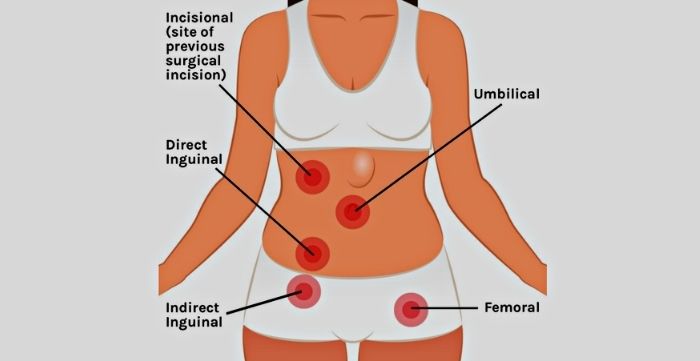 A hernia comes about when a tissue section swells through a weak body area—hernias mainly occur in someone’s abdominal wall.
A hernia comes about when a tissue section swells through a weak body area—hernias mainly occur in someone’s abdominal wall.
In this post, we’ll go through various body parts where hernia can occur. We will also provide detailed information about the types of hernias and their causes.
Hernia Causes
Hernias occur due to a combination of muscle strain and weakness. A hernia can develop over an extended period or a short period, depending on its cause.
Some hernias may be a medical emergency, while others may cause only a few symptoms. In case of a medical emergency, you can visit a gastroenterologist for hernia repair.
Below is a list of some causes of muscle strain or weakness that can cause hernia:
- Ascites
- Lifting heavy weights or strenuous exercise
- Aging
- A congenital condition, present from birth and occurs during development in the womb
- Pregnancy, particularly having multiple pregnancies
- Chronic obstructive pulmonary disorder or persistent coughing
- Obesity or being overweight
- Damage from a surgery or injury
- Constipation, which forces you to strain during a bowel movement
The risk factors that make you prone to develop a hernia include:
- Being older
- Pregnancy
- Obesity or overweight
- Chronic constipation
- Having low birth weight or being delivered prematurely
- Cystic fibrosis
- Family or personal history of hernias
- Persistent cough, because of repetitive abdominal pressure increase
- Smoking, which weakens the connective tissue
Types of Hernia
1. Inguinal Hernia
A prevalent hernia is the inguinal hernia, which is located around the abdomen’s inguinal canal. You may spot the hernia through a bulge in your lower abdominal, or around the groin for men and uterus for women.
Inguinal hernias occur more in men than women because the testicles go down through the inguinal canal soon after birth. The canal should close almost entirely behind them. In some cases, the canal doesn’t close well, leaving a weakened spot. Learn about inguinal hernias.
2. Hiatal Hernia
A hiatal hernia occurs when your stomach rises upwards and places pressure on your diaphragm. Your diaphragm is an essential sheet of muscles that helps you breathe through contracting and drawing in air to the lungs.
Another role of the diaphragm is to separate the chest organs (located in your chest cavity) from the abdominal organs. When the diaphragm is weakened, your stomach can extend into your chest and cause a hernia.
This kind of hernia occurs mainly in individuals above 50 years. This condition can also occur in children, however this is mainly due to congenital birth irregularity.
Most of the time, Hiatal hernias usually result in gastroesophageal reflux disease (GERD). Individuals with GERD typically experience a burning sensation due to stomach contents leaking back into the oesophagus.
3. Umbilical Hernia
Umbilical hernias appear when a child’s intestines push into the muscular wall of the abdomen (near the belly button). You can easily spot a bulge in or close to your child’s belly button, mainly when they are crying.
Umbilical hernias usually clear by themselves, this is because the muscles in the abdomen grow stronger with age and therefore can correct the protruding organ. It typically takes 1-2 years for abdominal wall muscles to grow stronger. If your child is above the age of 5 and their hernia hasn’t corrected itself, they may require surgery to fix it.
Umbilical hernias in adults occur due to recurrent strain on the abdomen or conditions such as pregnancy, obesity, or ascites (fluid in the abdomen). Umbilical hernias can also occur in adults. Find out more information on umbilical hernias.
4. Ventral Hernia
A ventral hernia usually occurs due to tissue bulging from an orifice in your abdomen’s muscles. Ventral hernias typically decrease in size when a person lies down.
Ventral hernias are usually acquired at some point in our lifetimes. However, they can also be present from birth. Factors that contribute to the formation of ventral hernias include strenuous activity, pregnancy and obesity.
Ventral hernias can also crop up at the site of a surgical incision. Such a hernia is referred to as an incisional hernia.
Incisional hernias usually occur as a result of the abdominal muscles at the surgical site scarring or weakening. You can read more on ventral hernias.
5. Femoral Hernia
A femoral hernia occurs due to tissue pushing through a weak area on the inner thigh or groin. The hernia usually feels like a small to medium lump in the groin.
According to a trusted source, it is estimated that 2-4% of hernias are found in the femoral groin area. This type of hernia is prevalent in women compared to men as the female pelvis has a larger width.
Femoral hernias rarely occur in children.
Activities such as lifting heavy weights or straining during bowel movements can result in femoral hernias.
The proximity of the femoral vein and artery makes femoral hernia concerning. There is a possibility that the hernia can affect these blood vessels and, as a result, prevent blood flow to and from the leg.
For this reason, doctors usually try to remedy a femoral hernia with surgery as soon as possible.
Your Takeaway
Hernias usually occur at different locations and are characterised by various symptoms. If you suspect that you have a hernia, contact your primary care physician, who might recommend a specialist to look at the hernia.
If your physician does not propose surgery, they will inform you of the symptoms that require immediate medical attention.
A hernia comes about when a tissue section swells through a weak body area—hernias mainly occur in someone’s abdominal wall.
In this post, we’ll go through various body parts where hernia can occur. We will also provide detailed information about the types of hernias and their causes.